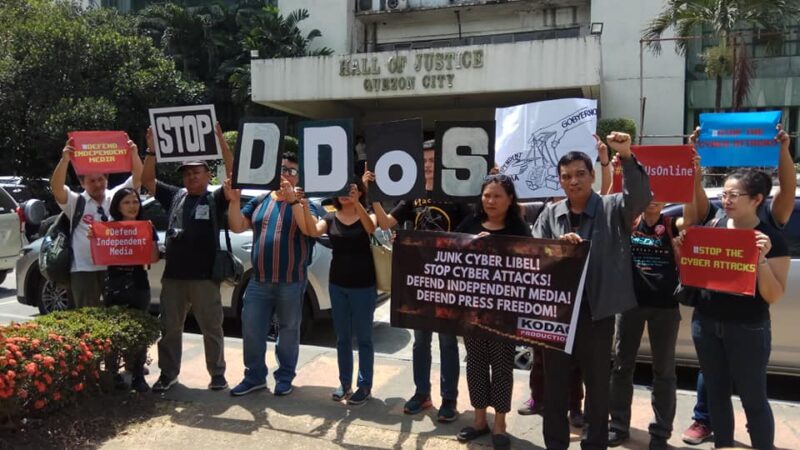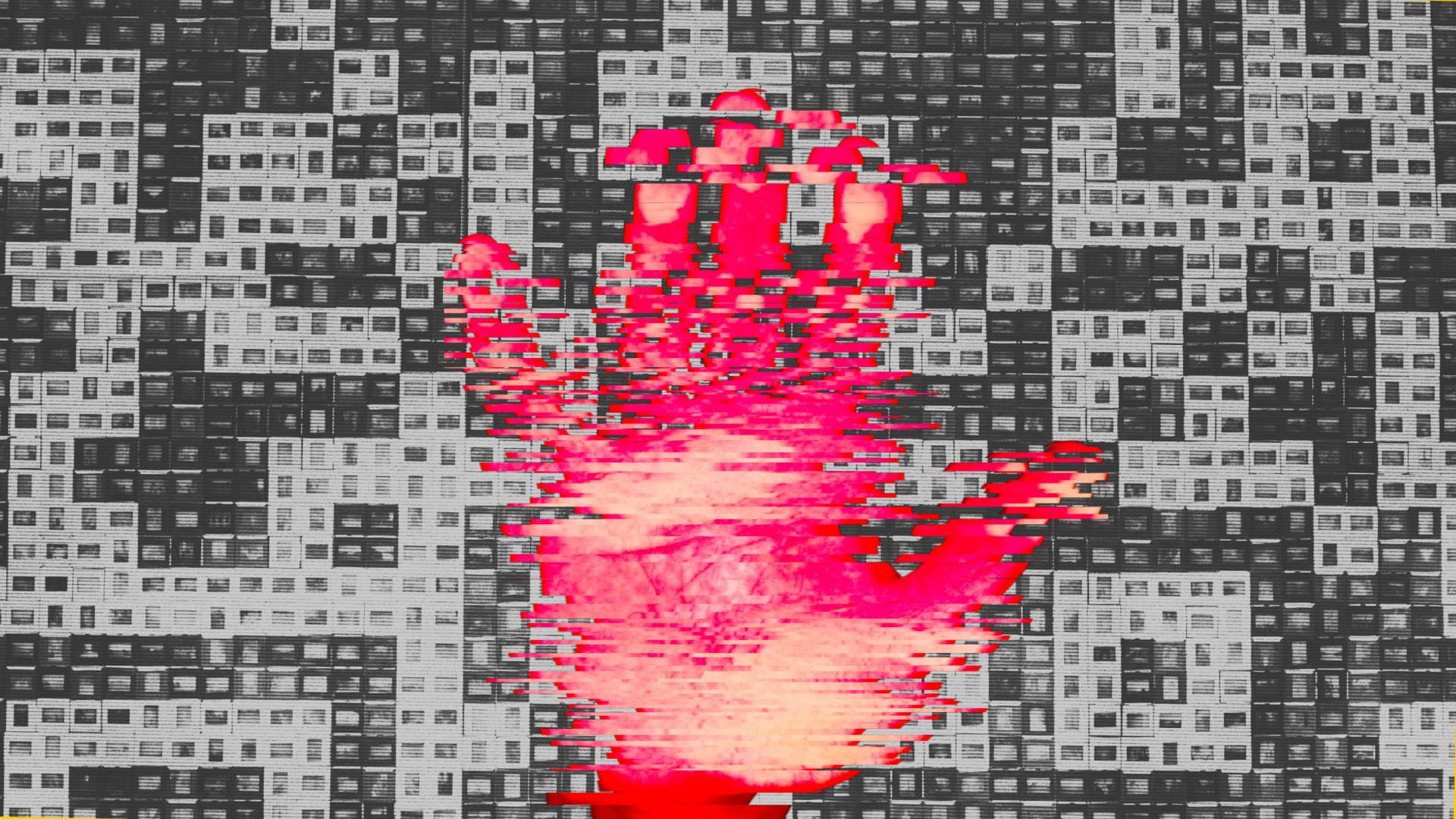
Image from Altermediya. Used with permission
In 1972, Ferdinand Marcos placed the Philippines under martial law, and immediately ordered the closure of all media outlets. Eventually, he allowed media outlets run by his cronies to operate. Many independent journalists were forced to go underground. The brave ones who wrote for independent news outlets were imprisoned for debunking the narratives of Marcos and his spin doctors.
After the ouster of Marcos in 1986, the anti-dictatorship struggle gave birth to a new constitution, which has enshrined freedom of the press, free expression and other basic civil and political rights.
However, in this era of technological advancement, wannabe dictators need not declare martial law to repress the media. Censorship has taken new forms. The objectives are the same: prevent truth-tellers from reaching their intended audiences, and deny the public access to reliable and relevant news and insights.
In the past five years, human rights organizations and media outlets in the Philippines have been subjected to distributed denial of service (DDoS) attacks — malicious attempts to disrupt the normal traffic of a targeted server, service or network by overwhelming the target or its surrounding infrastructure with a flood of internet traffic.

Image courtesy Len Olea
The first documented DDoS against a Philippine-based media outfit was in December 2018. For several days, the editors and staff of independent media outlet Bulatlat could not access its content management system to upload new articles. Its readers also reached out, complaining they encountered errors when visiting the url “bulatlat.com.” The last stories posted were about the 50th anniversary of the Communist Party of the Philippines (CPP), a party that has historically been regarded by the Philippine government as its enemy.
Digital rights advocates responded to Bulatlat’s call for assistance, confirming that the reason for the website downtime was a massive DDoS attack. Other media outlets — Pinoy Weekly, Kodao and Altermidya, all of which agreed to repost Bulatlat’s stories — were also targeted by DDoS attacks. All these media outfits have been red-tagged by government officials and state security forces for their independent reporting. Most of the stories published by these news websites focus on the issues of marginalized people, particularly farmers, the urban poor, workers, and Indigenous peoples.
It took nearly three months for Sweden-based non-profit Qurium Media Foundation to trace the attacks, and their investigation led them to two IT companies based in the Philippines.
Bulatlat and its web host Qurium reached out to the two companies via email, and to the Department of Information and Communication Technology (DICT) for assistance, to no avail. With the help of human rights lawyers from the National Union of Peoples’ Lawyers, Bulatlat, Pinoy Weekly, Kodao and Altermidya filed a civil case against the two IT companies. A compromise agreement was signed, with the two IT firms declaring they would not allow their infrastructure to be used to violate press freedom.
The DDoS attacks stopped for a while. By 2021, however, new DDoS attacks were recorded.
The same media outfits were initially targeted, at the same time that the Supreme Court was holding oral arguments on the petitions against the Anti-Terror Act (ATA). Human rights advocates opposed the draconian provisions in the ATA, and alternative media outfits published stories about this.
This time, Qurium’s investigation revealed that the cyber attacks were coming from the Philippine military, using the government infrastructure of the Department of Science and Technology. In a separate report, the government’s computer emergency response team confirmed Qurium's findings.
By December 2021, when the campaign period for the 2022 elections was heating up, other media outlets were subjected to DDoS attacks.
In 2020, ABS-CBN, the biggest broadcast network in the country, went off air after allies of then President Rodrigo Duterte denied the network a fresh franchise. After the network transitioned fully to online platforms, it announced that its website was hit with cyber attacks on December 11, 2021, causing portions of its website to become inaccessible for six hours. Before the incident, it published stories about activities commemorating Human Rights Day, including a tribute for victims of the Marcos dictatorship. The son and namesake of the ousted dictator was among the candidates for the presidency.
From December 2021 until May 2022, a series of DDoS attacks were aimed at the websites of news outfits Rappler, Vera Files, GMA News, TV 5, CNN Philippines, Interaksyon, Bulgar, PressOne, Mindanao Gold Star Daily, Bulatlat, and Kodao. A review of the articles published before the DDoS attacks showed that many of these incidents were likely election-related.
The attack on GMA News happened about a week after Jessica Soho interviewed the presidential candidates on January 22 — Marcos Jr. was criticized for declining invitations for the Jessica Soho interviews. The DDoS attack on CNN Philippines was done while it hosted a presidential debate on February 23, 2022 — where Marcos Jr. declined to participate. Investigation by Qurium and Rappler revealed that the December 2021 and January 2022 DDoS attacks on Rappler, ABS-CBN, and Vera Files had the same attack signatures.
A hacker group Pinoy Vendetta claimed to have orchestrated the January 2022 series of attacks against news websites. A government official praised Pinoy Vendetta as “computer geniuses.” The DDOS attacks in March 2022, meanwhile, targeted news outfits engaged in fact-checking posts about candidates in the May 2022 elections.
Mindanao Gold Star Daily, for example, ran articles debunking claims against Leni Robredo, then strong rival of Marcos Jr. in the presidential race. Vera Files, meanwhile, fact checked Marcos Jr.'s claim that round scad, a type of fish popular among the poor, was “easiest to raise.” Before being hit with DDOS attacks, PressOne debunked the claim that Robredo and two former government officials pocketed money meant for typhoon victims. The media outfit also labeled as satire the claim that Marcos Jr. will be canonized by Pastor Apollo C. Quiboloy.
In a statement, the National Union of Journalists of the Philippines condemned the DDoS attacks against newsrooms, calling these “a threat to press freedom and the free flow of information, both of which are vital during the election season.”
The cyberattacks against Philippine media outfits took place alongside massive disinformation campaigns. Lies were fed to the public via social media platforms. It’s a two-pronged approach in the propaganda war. Marcos Jr. was eventually declared the winner in the presidential race. Fifty years after the dictator Marcos declared martial law, his son reclaimed Malacanang palace.
Filipino journalists and the public in general must contend with and fight the new tools of authoritarian rule.

Please visit the project page for more pieces from the Unfreedom Monitor.



